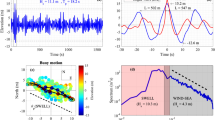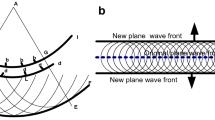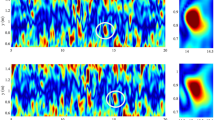Abstract
IT has been shown1 that the steepness of secondary waves riding on primary ones ranges from s(1-πS)-2 to s(1+πS)-2, at crest and trough of primary, S and s being primary and secondary steepness. The special case in which the tidal wave is the primary, and the larger wind-formed waves are the secondaries, is of some interest. As S is then almost nil, s does not vary. This means that the steepness of wind-formed waves is unaffected by the mere turn or making of the tidal stream. So some further explanation must be sought for the great change in the state of the sea when the stream turns to the weather, a change too great to be accounted for by the increase in speed of wind over water, and one which ordinarily takes place even after the wind has dropped, as will be assumed here.
This is a preview of subscription content, access via your institution
Access options
Subscribe to this journal
Receive 51 print issues and online access
$199.00 per year
only $3.90 per issue
Buy this article
- Purchase on Springer Link
- Instant access to full article PDF
Prices may be subject to local taxes which are calculated during checkout
Similar content being viewed by others
References
NATURE, 148, 226 (1941).
Author information
Authors and Affiliations
Rights and permissions
About this article
Cite this article
UNNA, P. Waves and Tidal Streams. Nature 149, 219–220 (1942). https://doi.org/10.1038/149219a0
Issue Date:
DOI: https://doi.org/10.1038/149219a0
Comments
By submitting a comment you agree to abide by our Terms and Community Guidelines. If you find something abusive or that does not comply with our terms or guidelines please flag it as inappropriate.



